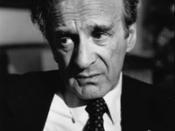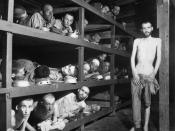The Holocaust claimed many lives. It claimed lives of the hopeless and the hopeful. However, the death toll balance weighed more to the hopeless. Amid the Holocaust it was difficult to remain hopeful amongst the cold, starvation, and beatings. In Night, the author Elie Wiesel uses characterization to suggest that death will not overcome you if you remain hopeful.
The main character and narrator in Night is Elie Wiesel (an American writer, winner of the Nobel Peace Prize, and survivor of the Holocaust). In the book Elie Wiesel is imprisoned in a Nazi concentration camp at Auschwitz and Buchenwald at the age of 16. While in the Nazi concentration camps Elie loses his faith in God and humanity, but remains hopeful that there is a chance of being free from the camps. ÃÂNo! He isn't dead! Not yet!ÃÂ (104), Elie said to two men who were attempting to throw his weak sleeping father out of the train along with all of the dead bodies.
Elie woke up his father in time to prove that he was alive, and the gravediggers moved off for another person. By remaining hopeful and persistent Elie was able to wake his father. The only thing you could have in the camps was hope, without it you would have nothing and death would be swift. When Elie was running with the crowd (86) he continued running because he had hope he could survive. It is very important to be confident in that kind situation because the smallest hesitation could lead to death. The major reason for Elie's hope was his father, Chlomo. He had to live in order to continue protecting his father from the camp. ÃÂTheir only hope for living became each otherÃÂ (37).
Soon after arrival in Auschwitz, Elie was greeted by Yehiel,


